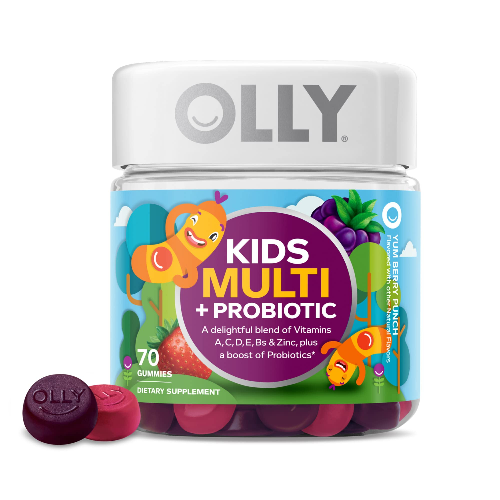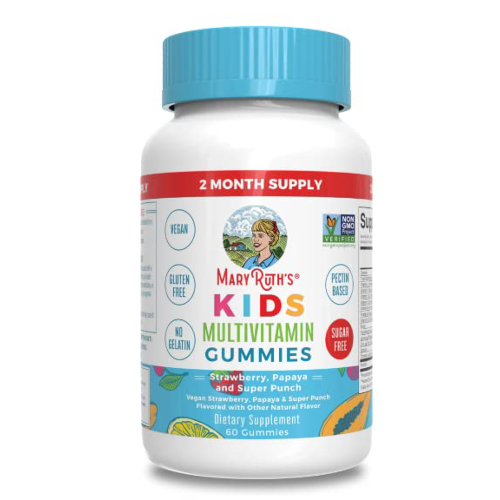Vitamin D is an essential vitamin for the development of bones and teeth in children. The best vitamin D supplements for kids can help protect those little bodies from brittle bones, weak muscles, and even tooth decay.
But it's not just about bone health: Vitamin D also supports the immune system, helps with asthma symptoms, and keeps your child happy and healthy overall. It even might prevent future diabetes type 2s!
To find the best vitamin D supplement for your child, look for a formula that has at least 1,000 IU per serving (and ideally closer to 2,000 IU). A chewable option is easier to swallow than a pill if your kiddo doesn't like taking vitamins or if you have multiple kids who all need to take them at different times of the day.
We hope you find your next favorite thing from the list below! Each product was independently selected by our editors. ConsistentReviews may collect a share of sales or other compensation from the links on this page if you decide to buy something (that's how we stay in business). We hope you find your next favorite thing!
How We Choose
We looked at a variety of factors when choosing the best vitamin D for kids, including dosage, ingredients, and customer reviews. We also checked with our experts to get their recommendations.
We chose products with safe and effective doses according to what our experts recommended. We also made sure they contained high-quality ingredients so your kids could benefit from them.
Finally, we looked at customer reviews to see what real customers were saying about the products. This helped us narrow down our list of top picks to only the absolute best options available on the market!
SmartyPants Kids Formula Daily Gummy Multivitamin
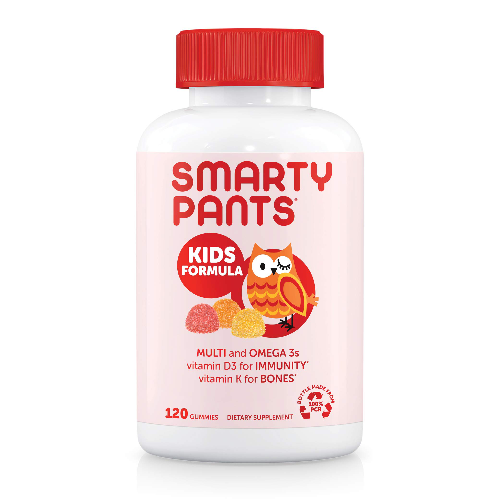
SmartyPants Kids Formula Daily Gummy Multivitamin
Fresh New Look, Same Trusted Quality
Why We Love It:
The SmartyPants Kids Formula Daily Gummy Multivitamin is a great choice for any child who wants to get their daily nutrients in a tasty form. This gummy multivitamin contains vitamin D3, B12, and zinc for immunity, plus omega-3 fatty acids from wild-caught fish oil.
What You Should Know:
The SmartyPants Kids Formula Daily Gummy Multivitamin also has folate in the form of methyl folate to help with red blood cell formation and choline to support brain health, growth, and development. The gummies are gluten-free, non-GMO, and free of synthetic colors or flavors so you know you're getting what you're paying for. They come in three delicious fruit flavors: Mango Tango (my personal favorite), Orange whiskey, and Watermelon Limeade which makes them easy to grab when on the go!
Overall this is a great multivitamin that will provide your kids with all the essential vitamins they need without any icky stuff - perfect if they have allergies or want to avoid certain ingredients found in other brands. It's affordable too considering it contains over 120 servings per bottle - meaning it'll last you a while before having to buy another one!
OLLY Kids Multivitamin + Probiotic Gummy
Why We Love It:
The Olly Kids Multivitamin + Probiotic Gummy is a great choice for kids between the ages of 2 and 8. It's packed with essential vitamins and minerals, plus a super-dose of probiotics to help support healthy belly bacteria and a strong immune system.
What You Should Know:
These chewable gummies are made from natural fruit flavors that taste delicious, so you can rest assured your little one will enjoy them. They're also gluten-free and contain no artificial colors or flavors, making them an excellent option for those who have dietary restrictions.
The product comes in 70 gummies per bottle which is enough to last your child around three weeks' worth of supplementation. The only downside we found was that it does melt easily during shipping, but this isn't too much of an issue as they are pretty solid when fresh out of the package.
SmartyPants Organic Kids Multivitamin, Daily Gummy Vitamins
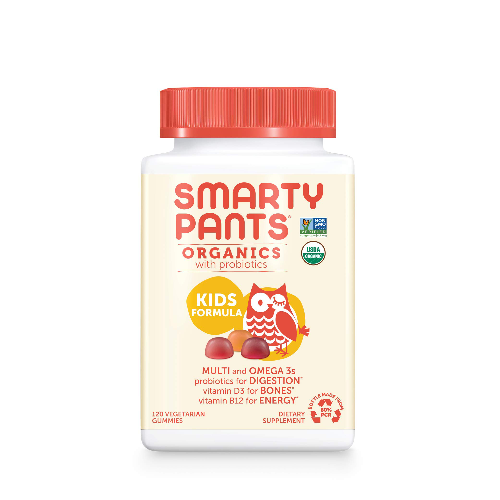
SmartyPants Organic Kids Multivitamin, Daily Gummy Vitamins
Backed Organic Kids Gummy Formula
Why We Love It:
The SmartyPants Organics Kids Complete Gummy Vitamins is a great choice for kids who are looking to get their whole diet covered in one shot. These gummy vitamins contain all of the essential nutrients that children need to grow and develop well, including probiotics and vegetarian omega-3s.
What You Should Know:
They also have 14 different essential nutrients, which is more than most other gummy vitamins on the market. The multivitamin also has Bacillus subtilis as its probiotic source, which means it will help keep your kid's digestive system healthy. The product includes organic flaxseed oil as its source of omega-3s, so you know you're getting a high-quality ingredient when you choose this over others out there.
One downside is the lack of shellfish-free options, but overall these are a great choice if you want your kids to get all of their nutrition from one source.
Amazon Brand - Mama Bear Organic Kids Vitamin D3 25 mcg (1000 IU) Gummies per serving
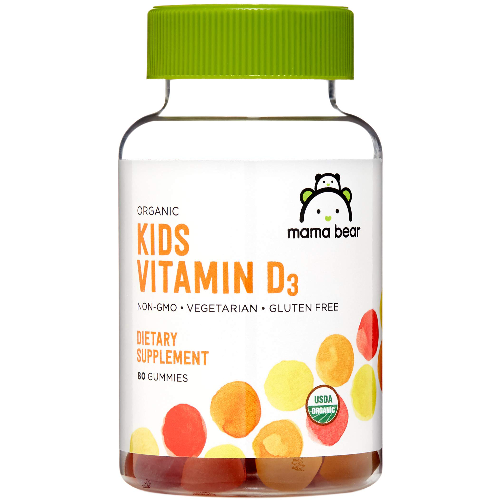
Amazon Brand - Mama Bear Organic Kids Vitamin D3 25 mcg (1000 IU) Gummies per serving
Helps Support Strong Bones and Immune Health
Why We Love It:
The Mama Bear Organic Kids Vitamin D3 Gummies are not only a great way to get your daily dose of vitamin D, but they also come in yummy strawberry, lemon, and orange flavors that make taking them a delightful experience. With their organic ingredients and carefully selected flavors, these gummies provide a tasty and enjoyable way for kids to support their overall health and well-being.
What You Should Know:
They're USDA organic, non-GMO certified, gluten-free, and vegetarian which is great for kids who may not be used to eating those types of foods. These gummies also contain 25 mcg (1000 IU) of vitamin D per serving which may support bone and immune health.
The only downside is that they do melt in the heat or sunlight, so it's best to keep them refrigerated until right before you consume them. Overall these gummies are a great way to ensure your kids are getting their daily dose of vitamin D without any hassle!
MaryRuth's Vitamin D3 | K2 | Drop | Liquid Supplement for Toddlers | Kids
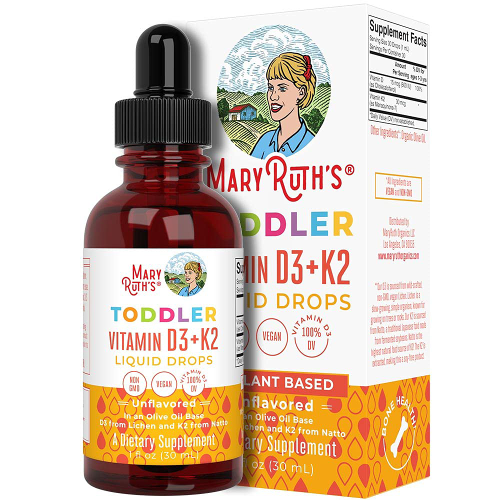
MaryRuth's Vitamin D3 | K2 | Drop | Liquid Supplement for Toddlers | Kids
Support Your Growing Toddler’s Bone Health
Why We Love It:
If you're searching for a high-quality vegan vitamin D3+K2 supplement that's not only suitable for toddlers but also meets the rigorous standards of USDA Organic certification, then look no further than Mary Ruth's USDA Organic Vegan Vitamin D3+. With its carefully selected ingredients and commitment to providing the best nutritional support, this supplement offers a trusted solution for supporting the health and well-being of your little ones.
What You Should Know:
Available in a spray format, this product is convenient and easy to use. Simply shake well before using and once daily, dispense up to 1mL or 30 drops directly into your child's mouth. It can be added to food or drink too so you don't have to worry about them spitting it out.
This liquid spray also contains olive oil which is an excellent source of essential fatty acids and has been linked with reduced risk of childhood obesity. The spray also contains non-GMO lichen which is sourced from wild-crafted plants - this means the product doesn't contain any synthetic ingredients or pesticides that may harm your baby's health.
Culturelle Kids Complete Chewable Multivitamin + Probiotic For Kids
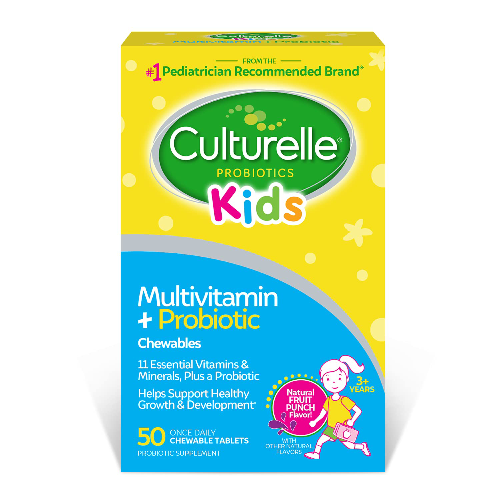
Culturelle Kids Complete Chewable Multivitamin + Probiotic For Kids
Support the Healthy Growth and Development of Your Child
Why We Love It:
The Culturelle Kids Complete chewable multivitamin is an excellent option for children who have an aversion to swallowing pills. These tablets, available in delightful fruit and vegetable flavors, are not only easy to ingest but also quite appealing to young taste buds.
What You Should Know:
This supplement contains 11 essential vitamins and minerals, including vitamin A, C, and E, which helps support healthy vision and immune function. It also contains the probiotic strain Lactobacillus rhamnosus GG (LGG), which has been shown in studies to help with occasional tummy troubles like diarrhea or upset stomach.
The Culturelle Kids Complete chewable multivitamin is an excellent source of zinc, helping to top off your child's diet with this important nutrient that supports bone growth and immunity. This product is gluten-free, vegan-friendly, sugar-free, non-GMO certified by NSF International - Certified Organic - Made in the USA - With no Harmful Chemicals Used In Manufacture.,
Renzo's Vitamin D3 for Kids - Vegan Vitamin D for Kids
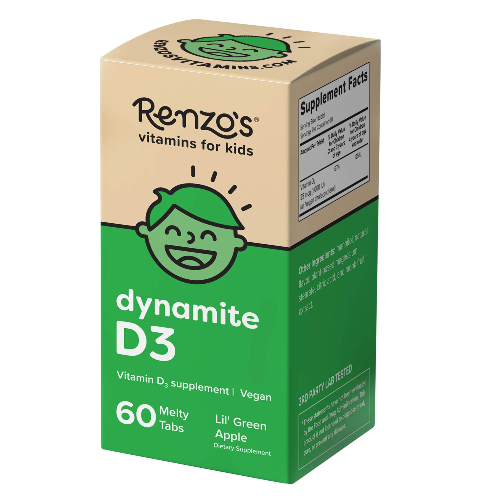
Renzo's Vitamin D3 for Kids - Vegan Vitamin D for Kids
Plant-Based Vitamin D3 for Kids
Why We Love It:
Renzo's D3 Melty Tabs are the perfect option for children who have an aversion to swallowing pills. These delightful tablets, which are vegan, non-GMO, and sugar-free, effortlessly dissolve in water or juice, offering a delectable taste sensation.
What You Should Know:
The formula is also free of artificial colors and flavors so you know you're getting something that tastes good without any weird additives. They do contain sucralose as an excipient (a substance used to help the tablet dissolve), but it's very low compared to other brands we reviewed.
While these vitamins aren't the most expensive on our list, they are still quite pricey considering they only contain 100 IU of vitamin D per serving - which is less than many cheaper options on the market.
Ddrops Kids Booster 600IU 100 Drops - Daily Liquid Vitamin D for Kids
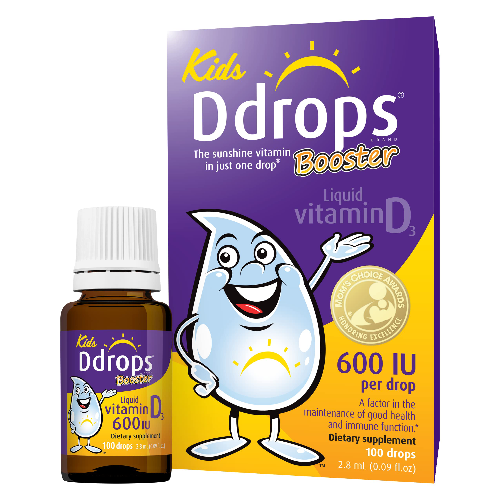
Ddrops Kids Booster 600IU 100 Drops - Daily Liquid Vitamin D for Kids
Helps Support Immune Function and the Development of Bones and Teeth.
Why We Love It:
The Ddrops Kids Booster 600IU 100 Drops is a great option for children who are looking for an easy way to get their daily dose of vitamin D. This product comes in a convenient liquid form that makes it easy to add to your child's favorite drink or food.
What You Should Know:
It also has no preservatives, additives, artificial flavors, colors, or common allergens making it safe for kids of all ages and immune system support too. The bottle contains one hundred drops so you don't have to worry about running out quickly - just fill the bottle up as needed and enjoy!
We recommend this product if you're looking for an affordable way to make sure your child gets their daily dose of vitamin D without any hassle.
ChildLife Essentials Vitamin D3 - Vitamin D Drops for Kids
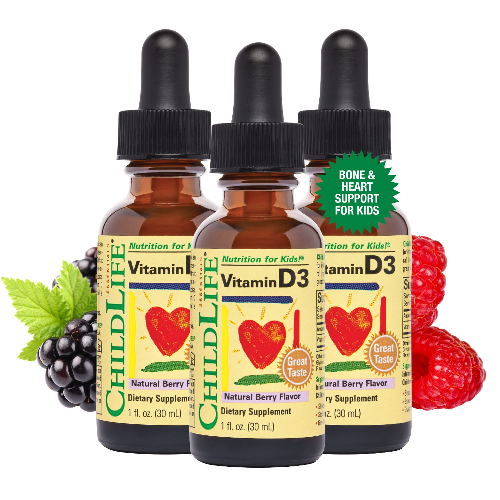
ChildLife Essentials Vitamin D3 - Vitamin D Drops for Kids
Proper Levels of Vitamin D for Kids
Why We Love It:
CHILDRlife Essentials D3 Drops offer a fantastic solution to ensure your child receives the optimal amount of vitamin D. These drops are available in three delightful flavors: Berry, Orange Cream, and Mango Tango. With this selection, providing your child with essential nutrients has never been easier or more enjoyable.
What You Should Know:
The berry flavor is our favorite because it tastes great and goes well with just about anything you want to add it to. We like to use them in water or juice for an easy way to get vitamin D benefits without worrying about any added calories or sugar. These drops are made from all-natural ingredients so you know you getting quality when you purchase them.
We recommend giving your child 6-8 drops a day until they reach their optimal level of health, which can help support immune system function, respiratory and heart health as well as bone health during childhood.
MaryRuth's Kids Multivitamin Gummies
Why We Love It:
MaryRuth Organics Kids Multivitamin Gummies are an excellent choice for children who struggle with swallowing pills or hard candies. These delicious gummies provide a convenient and effortless way for kids to get their essential vitamins and minerals. With their fun and chewable form, parents can rest assured that their children are getting the nutrients they need without any hassle. Say goodbye to the struggles of medication time and hello to a stress-free and enjoyable experience for both kids and parents alike!
What You Should Know:
They come in three delicious flavors: strawberry, papaya, and super punch. Each one contains a full complement of vitamins and minerals that your child needs to stay healthy and strong. They're also free from gluten, dairy, corn, nightshade, soy, and sugar so they can be safely consumed by those with allergies or intolerance concerns.
These gummies are formulated for kids 2 years old and older but can be taken by children of any age as long as they have a doctor's approval.

There's a lot of conflicting information out there when it comes to vitamin D and kids.
Even as parents, it can be tough to know who or where to trust for the best answers. With so much conflicting information out there, you may end up feeling more confused than ever before!
We've put together a list of some of the most Frequently Asked Questions about vitamin D supplements and kids so that you can make an informed decision about your family's needs.
Which Form Of Vitamin D Is Best Absorbed?
Since vitamin D is a fat-soluble nutrient, it's absorbed best when taken with a meal or drink that contains some fat. This can make the question of how to take your vitamin D even more confusing, since you may be advised to take it with food or not by your doctor.
The form of vitamin D you choose will also affect how well you absorb the nutrient. Vitamin D3 (cholecalciferol) is the kind found in animal products like eggs and fish, as well as plant foods and fortified foods with vitamin D (like milk). It's also what your body produces when exposed to sunlight.
Vitamin D2 (ergocalciferol), on the other hand, is found in plants and yeast and most often comes from dietary supplements made from an ingredient like erythritol. While both forms are beneficial for overall health, studies have shown that vitamin D3 may be better absorbed by humans compared to its counterpart. One study showed that people who took 1,000 international units (IU) of vitamin D3 had higher blood levels compared to those who took 1,000 IU of vitamin D2 over 12 weeks.
What Form Of Vitamin D Is Best For Kids?
While we can get enough vitamin D from food sources, such as fortified breast milk, and certain types of fish, it's also available in pill form. However, not all forms are recommended for children.
The two types of vitamin D supplements that pediatricians recommend are:
Vitamin D3 (cholecalciferol): This is the most common form of vitamin D used to correct vitamin D deficiency or prevent it from happening in the first keep in mind first place. It can be given daily alongside a meal. Vitamin D3 is usually taken by parents to ensure their kids are getting enough of the nutrients each day.
This active ingredient is the type you'll find in multivitamin supplements for children and adults. Vitamin D3 is also an active ingredient found in some milk alternatives like soy and almond milk, but this version isn't considered “natural” by many doctors since it's derived from yeast extract unless otherwise noted on the product label. Some studies have shown that cholecalciferol may have stronger absorption rates than other forms though.
A cup of fortified milk contains about 100 IU (international units), which is less than what's recommended yearly for kids between ages 1 through 3 years old (400 IU). For those ages 4 through 8 years old, 400 IU per day is optimal; while those 9 through 13 years old need 600 IU per day; and teenagers 14 through 18 years old should aim for at least 800 IU per day if they're still growing or already finished growing up entirely.
Should Kids Take Vitamin D Everyday?
While there has been a lot of debate over whether or not children need to supplement their vitamin D levels, the official recommendation is that everyone, including young children, should be getting enough sun exposure to maintain healthy vitamin D levels. An intake of around 400 IU per day (the equivalent of four ounces of milk) is sufficient to meet this requirement and can be obtained through a well-balanced diet.
Vitamin D supplements are recommended for at-risk groups, such as babies being exclusively breastfed and those who don't get outside very often (for example, those with limited mobility), but if you do choose to give your child a supplement make sure it's in the form of D3 rather than D2.
How Much Vitamin D Should I Give My Child?
The amount of vitamin D you give your child will depend on what kind of vitamin or mineral supplement they are taking. If your child is taking a daily supplement, the recommended dose is 400 IU or 10 mcg. This should be taken every day to maintain adequate levels. You should not exceed this dosage unless recommended by your doctor.
If your child requires high doses of vitamin D for medical reasons, then the correct dosage may vary significantly depending on which product you choose and how much it can hold. Your doctor will be able to help you determine the right dosage for your child based on their individual needs and any health concerns they may have.
Which Is Better Absorbed D2 Or D3?
The form of vitamin D found in foods is cholecalciferol, also known as D3. This is the type of vitamin D produced by our bodies when sunlight hits our skin through a process called photoconversion.
The form of vitamin D most often added to foods and supplements is ergocalciferol, or D2, which comes from plants and yeasts. Some research has shown that ergocalciferol may be less well absorbed than cholecalciferol, leading some experts to suggest that it's better to get your nutrients from food sources whenever possible.
However, other research points out that people with low absorption issues may benefit from taking both forms of this essential nutrient. If you have concerns about absorbing vitamins either through your diet or through supplementation, consult with your doctor or a registered dietitian for more guidance on the best approach for you.
What Blocks The Absorption Of Vitamin D?
The body can produce sufficient amounts of vitamin D through exposure to the sun, but this process can be hindered by a variety of factors.
For one thing, many people don't spend enough time outdoors. This is especially true in northern latitudes, where there isn't much sunlight for much of the year. In addition, many people wear sunscreen when they are outside since it's important to have sun exposure to protect their skin from damage and early signs of aging.
Even if you put on a high-SPF sunscreen, though, not all UVB rays get blocked out. Those that do promote vitamin D absorption travel right through the glass in your windows – so even if you're inside, you could still benefit from some sunlight exposure!
What Is The Difference In Vitamin D And Vitamin D3?
Vitamin D is a collective term used to describe several different forms of the vitamin, including Vitamin D2 and Vitamin D3. These vitamin D deficiencies are all naturally found in some foods, such as eggs, milk, and fish.
Vitamin D3 is the type that you'll find in dietary supplements as well as many fortified foods like milk and orange juice. While both types are effective when it comes to maintaining healthy blood levels of calcium and phosphate, research suggests that Vitamin D3 is the most effective at helping promote bone health.
When Should I Take Vitamin D Morning Or Night?
The best time to take vitamin D supplements depends on the type you're taking. If you have a prescription from your doctor for high-dose supplemental vitamin D, then you must follow their instructions. These capsules are taken either once a week for three consecutive weeks or once every two months.
If you have a prescription for regular supplemental vitamin D, then it's best to take them in the morning with breakfast. This will allow the maximum amount of time for absorption into the bloodstream and better coverage throughout the day.
Why Do Doctors Prescribe Vitamin D2 Instead Of D3?
Doctors used to prescribe D3 instead of D2, but in the 90s research came out showing that D3 was much more effective for raising blood levels of the vitamin. Since then, doctors have prescribed D3 almost exclusively.
However, many people still take a vitamin D supplement that contains D2 because they either didn't realize their prescription had changed or they've picked up an old bottle from a pharmacy. It's also worth noting that some foods such as milk and orange juice are fortified with vitamin D2 so it can be hard to avoid if you want to switch over completely.
How Do You Maximize Vitamin D Absorption?
There are a few simple things you can do to increase your absorption of vitamin D:
Take it with fatty foods. Vitamin D is absorbed in the small intestine, and the ileum which is the last part of the small intestine – is where most vitamins are absorbed. Fatty foods help move nutrients through the ileum so they get into your bloodstream.
It's no surprise then that many vitamin D supplements contain fat along with vitamin D. Some manufacturers even add an oil like coconut or palm kernel to their soft gels. Taking these pills with meals will also ensure you're absorbing as much of this nutrient as possible.
What Is The Most Absorbable D?
The most absorbable form of Vitamin D is that which comes in the form of cholecalciferol, or D3. This is the version of vitamin D supplementation you'll find in most supplements and all animal-based foods like eggs, meat, and fish.
Some research has shown that vitamin supplements with cholecalciferol may be more effective than ergocalciferol (D2), the other common form of Vitamin D. However, it's important to note that both are considered to be very effective at raising blood levels of this essential nutrient.
Vitamin D can also be found naturally in some plant-based foods such as mushrooms and fortified products like milk. Interestingly, research shows that many people fail to absorb this form properly because their bodies aren't equipped with the proper enzymes needed for absorption.
What Is The Most Active Form Of Vitamin D?
Provitamin D3, also known as cholecalciferol, is the most active form of vitamin D. It's the type of vitamin D your body makes when exposed to sunlight. Animals make it and we eat it in foods such as eggs and dairy products. But cholecalciferol isn't the only form of vitamin D. Other forms include:
Vitamin D2 (ergocalciferol) - This is a plant-based version of fat-soluble vitamins that are found in some kinds of fish oil, edible mushrooms, and fortified food products like cereal bars. Many vegan diets rely on this form for their intake of fat-soluble vitamin D.
Vitamin DH3 (cholecalciferol) - Manufacturers create this synthetic version by mixing parts from both animal fats and plants.
How does the body's Vitamin D production affect the need for Vitamin D supplements in kids?
The body's Vitamin D production is a crucial factor when considering the need for Vitamin D supplements in kids. Vitamin D is primarily produced in our skin in response to sunlight. However, many factors can affect this, such as living in northern latitudes, having darker skin, or spending too much time indoors.
If a child isn't getting enough Vitamin D through sunlight or diet, a supplement providing 400 IU of Vitamin D, the recommended daily intake for kids, may be necessary to ensure healthy bone and immune system development.
What should I look for on the supplement label when choosing a Vitamin D supplement for my kids?
When selecting a Vitamin D supplement for your kids, it's important to closely review the supplement label. The label should indicate the amount of Vitamin D per serving, often denoted as 400 IU for children's supplements.
Additionally, if your child is also taking an iron-containing supplement, make sure to check for any potential interactions. Always choose products that have been third-party tested for quality and purity and are age-appropriate for your child.

In conclusion, Choosing the right vitamin D supplement for your child can be a tricky task. With so many options available on the market, it is important to do your research before making a purchase decision. Start by assessing your child's vitamin D status using a blood test and discuss the results with their doctor. Then, assess how much vitamin D is in each supplement and compare prices between brands.
Lastly, consider what type of supplement will work best for your child's age – liquid chewable or tablet form – as well as any potential side effects from taking too much vitamin D too quickly, which can all factor into the final decision on which one is best for you and your family. With these considerations in mind, parents can find the perfect supplement that meets both their needs and their budget while ensuring they are meeting daily recommended levels of this essential nutrient.
Tap the buttons above to “Check Price” on our recommendations or broaden your search in case our selections do not meet your expectations!
Thanks for spending time with ConsistentReviews and happy shopping! Pace yourself... Tomorrow is another brand-new Shopping Day!



